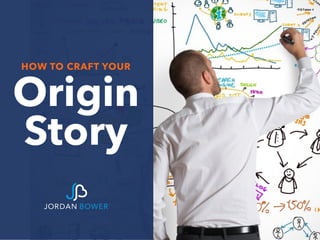
How to Craft Your Origin Story
- 1. Origin Story HOW TO CRAFT YOUR
- 8. We know that people are substantially more motivated by their organization’s transcendent purpose (how it improves lives) than by its transactional purpose (how it sells goods and services). PAUL ZAK, WHY YOUR BRAIN LOVES STORIES HARVARD BUSINESS REVIEW
- 9. whose vision and values? • People as a competitive advantage • Ethics • What’s right for customers • Diversity and inclusion • Leadership
- 11. 01 MAXIM OF STRATEGIC STORYTELLING Every act of communication is an act of storytelling.
- 13. Our brains are wired for story.
- 14. During successful communication the listener’s brain responses become similar to the speaker’s brain responses. This implies that people understand each other by mirroring each other’s brain responses. URI HASSON, NEUROSCIENTIST, PRINCETON
- 15. Aristotle’s Rhetorical Triangle Storyteller (Ethos) Content (Logos)Audience (Pathos) CONTEXT STORY
- 16. 02 MAXIM OF STRATEGIC STORYTELLING Stories create connections between tellers and audiences.
- 23. Sympathy Empathy “I understand what you're feeling.” “I feel what you're feeling.”
- 24. The evolutionary function of storytelling is to reveal the immaterial. MASLOW’S HIERARCHY OF NEEDS
- 27. why strategic storytelling? • set a vision • say “why now” • improve the impact of case studies • build trust and uncover pain • create alignment within teams • anticipate and celebrate change
- 28. 03 MAXIM OF STRATEGIC STORYTELLING Stories have a setting in time and space.
- 31. Stories are made of waves of emotional tension and release.
- 32. 04 MAXIM OF STRATEGIC STORYTELLING Character relationships raise dramatic intensity.
- 33. Joseph Campbell’s Hero’s Journey
- 34. Margaret Murdock’s Heroines’s Journey
- 35. every origin story has • an inciting incident • a reaction according to the “old pattern” • a loss • a sense of spiritual aridity • a new discovery • a sense of being “the only one who understands” • a process of returning to the world • a spark of universal wisdom
- 37. 05 MAXIM OF STRATEGIC STORYTELLING Great stories are built upon universal themes.
- 38. an origin story: • tells us where you’ve come from • suggests a roadmap for where you’re going • illuminates your values • answers why? • is more memorable than a biography • is more relatable than a CV • avoids the passionate about problem
- 39. 06 MAXIM OF STRATEGIC STORYTELLING We need storytellers more than ever.
- 40. MAXIM OF STRATEGIC STORYTELLING The growth of the Internet will put jobs into three categories: 1. People who tell computers what to do. 2. People who do what computer tell them to do. 3. Storytellers who help people cope.
- 41. Storytelling Training Storytelling Consulting • Leaders • Sales Teams • Data Scientists • Entrepreneurs • Branding • Strategic Planning • Vision/Mission/Values • Cultural Development
- 42. Origin Story Summary HOW TO CRAFT YOUR
- 43. Don’t bore your audience with the facts.
- 44. Tell a story that is happening in time and space.
- 45. Focus on a choice or turning point.
- 46. Focus on a choice or turning point. Create clear, relatable characters.
- 47. Focus on a choice or turning point. Create clear, relatable characters. Structure your story in the order your audience learns and feels things.
- 48. Include the part of your story you’re scared to tell.
